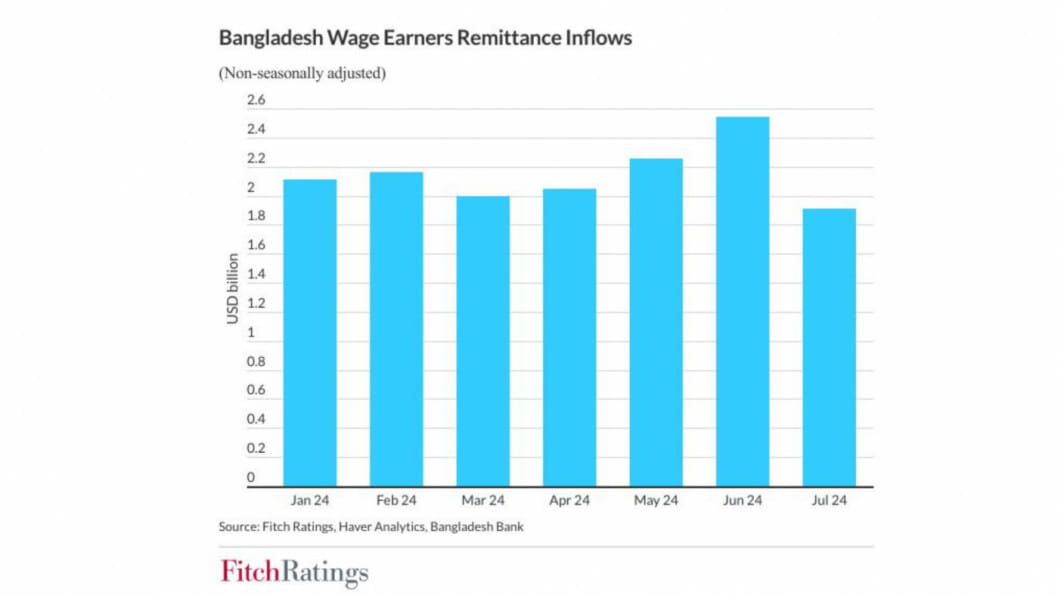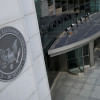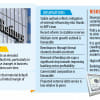Uncertainty remains heightened in Bangladesh amid political transition: Fitch

The fall of Bangladesh's Awami League government, after protests in July and August, raises uncertainty about the sovereign's credit profile, said American credit rating agency Fitch Ratings.
Downward pressure on Bangladesh's rating could increase if the political transition faces challenges, including prolonged political violence, or leads to policy paralysis and exacerbates fiscal or external stresses, it said.
Fitch downgraded Bangladesh's rating to 'B+'/Stable, from 'BB-'/Negative, in May 2024, which reflected sustained weakening of the country's external buffers, leaving the country more vulnerable to external shocks.
"We believed that this weakening would be challenging to reverse, despite reforms under an IMF-backed programme, including a shift towards greater exchange-rate flexibility."
Fitch believes the protests are likely to affect economic metrics in the current quarter, hurting growth and tax revenue collection, as well as pushing up consumer price inflation, which reached 11.7 percent year-on-year in July 2024.
There is also likely to be an impact on readymade garment (RMG) exports and remittance inflows, Bangladesh's two key sources of foreign earnings.
"At this stage, we assume these effects to be temporary, and that political stability is restored and sustained," the agency said.
The appointment of an interim government on August 8 appears to have eased the immediate political instability, but Bangladesh's society remains highly polarised and the longer-term political direction uncertain, it said.
A roughly 11 percent recovery in the Dhaka Stock Exchange's DSEX Index between end-July and August 13 signals moderate investor confidence in the interim administration, suggesting large-scale capital flight is a low risk for now.
However, confidence could weaken if the ongoing transition does not go smoothly and adverse economic effects could mount.
"The timing of prospective elections remains unclear. Deciding this, and subsequently holding elections, could raise political risk."
Furthermore, political gridlock remains a possibility following such elections, as the diverse range of political actors - the somewhat weakened Awami League, the Bangladesh National Party, the other main party, the student movement that led the recent protests, the military and Islamist groups – compete for power.
Another risk is that foreign firms could scale back RMG orders or source from other markets, which could add to external pressures, it said.
"We stated in May that increased external vulnerability, for example, due to a marked decline in foreign-exchange reserves or other liquidity buffers, could lead to negative rating action."
Reserves at end-June, before the protests, stood at $21.8 billion - an estimated four months of import cover. This is higher than the $18.4 billion in May when Fitch completed its rating assessment.
Moreover, near-term debt repayment pressures should be moderate.
The public sector's external debt service due in 2025 is about $4.3 billion, of which $1.5 billion is bilateral debt and $2.2 billion is owed to multilaterals.
"We expect financing from these official creditors to continue under our baseline, supporting external debt servicing capacity. Nonetheless, future reserves data will be a key metric to analyse the impact of the ongoing political transition on external liquidity strains," Fitch said.
If the interim or next government were to backtrack on the previous government's recent commitment to greater exchange-rate flexibility in a bid to shore up near-term macroeconomic stability, intervention to support the taka could add to pressure on reserves, the agency said.
"However, we believe this risk to be contained."
"We also assume that the interim government, as well as its successor, will adhere to the broad policy commitments under Bangladesh's IMF programme, but significant political instability or gridlock could complicate programme adherence," it said.
Significant slippage on key programme targets like fiscal metrics and exchange-rate liberalisation could jeopardise Bangladesh's access to IMF and other multilateral funding support, further weakening its external position and increasing the risk of negative sovereign rating action, the American agency said.

 For all latest news, follow The Daily Star's Google News channel.
For all latest news, follow The Daily Star's Google News channel. 








Comments